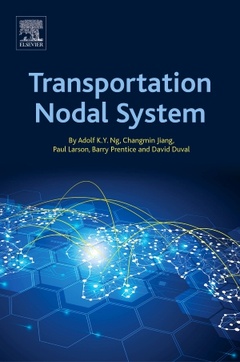Transport Nodal System
Auteurs : Ng Adolf K.Y., Jiang Changmin, Larson Paul, Prentice Barry, Duval David Timothy

Transport Nodal System provides a comprehensive introduction to the development of transport nodes and nodal systems, focusing on economic, operational, management, planning, policy, regulation and sustainability perspectives. Through a deep analysis on different types of transport nodes from diverse perspectives, this book shows the major issues and challenges that transport node planners, managers, and policymakers face, and how to address them. The book provides a clear framework for identifying the common attributes across all nodes that contribute to the efficient operations, planning, and management of transport facilities.
Transport nodes such as seaports, inland terminals, airports, highways, and railroads are hubs in a multimodal transportation network that facilitate the smooth operation of passengers and freight. The book uniquely uses the transport node itself rather than a specific type of structure for a specific type of transport mode as the primary focus of analysis. While stressing the importance of transport nodes in developing efficient logistics and supply chains, the book also demonstrates that transport nodes are geographically embedded within a particular location, and that operations are inevitably affected by local factors, such as culture, the economy, the political and regulatory environment and other institutions.
1. Introduction2. Transport Networks and Impacts on Transport Nodes3. Measuring Transport Nodes and Nodal Systems4. Policy and Regulations of Transport Nodes and Nodal Systems5. Congestion in Transport Nodes and Nodal Systems6. Planning Transport Node and Nodal System Projects7. Sustainability and Resilience of Transport Nodes and the Nodal System8. Transport Nodes and Supply Chain Sustainability9. Innovations in Transport Nodes and Nodal Systems: Airship Transportation Systems and Aerodome Requirements10. Climate Change and its Impact: Opening up the Arctic Seas for Maritime Transport
Researchers, graduate students, policymakers, and practitioners in sustainable transportation, supply chain management, transport management, transport economics, transport geography, transport Infrastructure management, and transport policy.
Changmin Jiang is an associate professor of Transport and Supply Chain Management at the University of Manitoba in Canada. He is one of the leading young scholars worldwide in the field of transport economics and policy in the sectors of aviation, rail, and maritime. He has published more than 20 papers in top-tier transportation and management journals and has received many prestigious accolades such as the Falconer Emerging Researcher Rh Award.
Paul D. Larson, Ph.D. is the CN Professor of Supply Chain Management at the University of Manitoba. He is also currently a Distinguished Senior Fellow/Professor in SCM and Social Responsibility at Hanken University. From 2005 to 2011, he was Head of the SCM Department and Director of the Transport Institute at the University of Manitoba. From 2006 to 2009, he led a curriculum development team, creating a new accreditation program for the Purchasing Management Association of Canada (PMAC), which has since merged with Supply Chain Logistics Canada to become the Supply Chain Management Association (SCMA). The Institute for Supply Management (ISM), unde
- Provides a unified look at multimodal transportation nodes to gain a better understanding of total system performance
- Includes numerous case studies from developed and emerging economies
- Uses an interdisciplinary approach where policy, regulations, economics, strategic management, operations, sustainability and technological innovation are considered together
- Features chapters by scholars who specialize in different transport modes (land, sea and air)
- Up-to-date outcomes utilizing author’s original research provide a systematic investigation of the nodal system in both theory and practice
Date de parution : 01-2018
Ouvrage de 204 p.
15x22.8 cm
Thème de Transport Nodal System :
Mots-clés :
Adaptation; Airdocks; Airport; Airship gateways; Airship hubs; Arctic shipping; Arctic transport; Arctic; Baggage; Canada; Canadian Shield; Cargo airships; Centralities; China; Climate change; Congestion; Development; Economic regulation; Environmental pollution; Gateways; Graph theory; Ground handling; High-speed rail; Hong Kong; Hubs; Ice roads; Industrial location; Institution; Internalization; Knock-on effect; Market power; Natural resources; Nodal concentration; Nodal systems; Policy; Project planning; Regional expansion; Regulation; Resilience; Shipping; Spatiality; Sustainability; Terminal charges; Tourism; Trade corridors; Transport nodes; Transport; Transshipment; World cities



